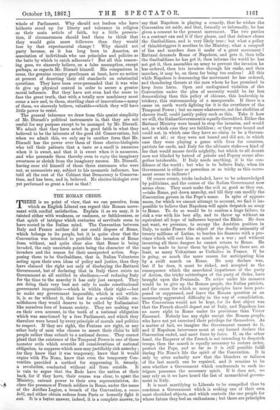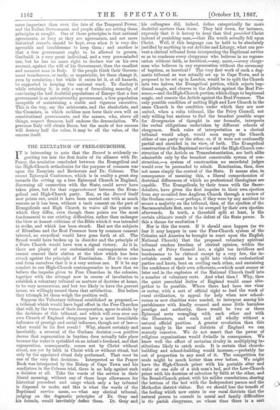THE ROMAN CRISIS.
THERE is no point of view, that we can perceive, from which an English Liberal can regard this Roman move- ment with cordial satisfaction. Explain it as we may, it is tainted either with weakness, or rashness, or faithlessness, or that spirit of intrigue which centuries of servitude seem to have rooted in the Italian mind. The Convention between Italy and France neither did nor could dispose of Rome, which belongs to its people, but it is quite clear that the .Convention was intended to prohibit the invasion of Rome from without, and quite clear also that Rome is being invaded, the only uncertain points being the character of the Invaders and the reason for their unexpected action. Sup- posing them to be Garibaldians, that is, Italian Volunteers acting upon their own ideas of policy and justice, then they have claimed the right not only of disobeying the Rattazzi Government, but of declaring that in Italy there exists no Government at all entitled to obedience,—of reducing Italy for the time to the anarchy it has only just escaped. They are doing their very best not only to make constitutional government impossible—which is within their right—but to make any government impossible, which is not within it, is so far without it, that but for a certain visible un- selfishness they would deserve to be called by Italianissimi like ourselves foes of human society. They are making war on their own account, in the teeth of a national obligation which was sanctioned by a free Parliament, and which they therefore were bound by every principle of morals and politics to respect. If they are right, the Fenians are right, or any -other body of men who choose to assert their claim to kill people rather than submit to a national decree. They cannot plead that the existence of the Temporal Power is one of those monster evils which override all considerations of national obligation, to suppress which men may justifiably risk anarchy ; for they knew that it was temporary, knew that it would expire with Pio Nono, knew that even the temporary Con- vention provided a method for suppressing it, namely, a revolution, conducted without aid from outside. It is vain to argue that the Reds have the nation at their back, for if they have, their course was clear, to upset the Ministry, entrust power to their own representatives, de- olare the presence of French soldiers in Rome, under the name of the Antibes Legion, a breach of the Convention, a casus Belli, and -either obtain redress from Paris or honestly fight it out. It is a better answer, indeed, it is a complete answer, to say that Napoleon is playing a comedy, that he wishes the Convention set aside, and that, formally or informally, he has given a consent to the present movement. The two parties to a contract can end it if they please, and that defence clears the Garibaldians, and is very likely true ; but what a policy of thimbleriggers it ascribes to the Ministry, what a cesspool of lies and murders does it make of a great movement I Rattazzi demands Rome of Napoleon, and gets it, then tells the Garibaldians he has got it, then informs the world he has not got it, then assembles an army to prevent the invasion he has ordered, then lets invaders through his ranks, and then marches, it may be, on them for being too zealous ! All this while Napoleon is denouncing the movement he has ordered, and thundering threats at the men whom he has promised to keep from harm. Open and undisguised violation of the Convention under the plea of necessity would be far less demoralizing than this policy of chicane, this leadership in trickery, this statesmanship of a masquerade. If there is a. cause on earth worth fighting for it is the overthrow of the Temporal Power • but no cause whatsoever, not the abolition of slavery itself, could justify policy such as this. Take it how we will, the Italian Governmentis equally discredited. Either the Rattazzi Ministry were bound to stop the invasion, and would not, in which case they are faithless ; or they were bound and could not, in which case they have no claim to be a Govern- ment at all ; or they were not bound and did not, in which case they were playing a game with lives for counters, patriots for cards, and Italy for the ultimate stake—a kind of loo that would amuse devils mightily, but which to all decent men not blinded by hatred of priests and Popery seems alto- gether intolerable. If Italy needs anything, it is the con- fidence of the world ; but who is to believe Italy, when its Government is either so powerless or so tricky as this move- ment seems to indicate V Of course events, tricks included, have to be acknowledged by politicians, and the course of the Italian Government now seems clear. They must make the evil as good as they can. —take Rome, put down anarchy, and till they can modify the Convention govern in the Pope's name. In spite of appear- ances, for which we cannot attempt to account, we find it im- possible to believe that Napoleon will again despatch an army to Rome. To do so would be to confess a huge failure, to risk a war with his best ally, and to throw up without an equivalent all hope of influence beyond the Rhine. He does not want, we presume, to occupy the Austrian position in Italy, to make France the object of the deadly animosity of twenty millions of Latins, to burden his finances with a pro- vince which will cost him as much as a war ; and without incurring all these dangers he cannot return to Rome. He may be made to incur them by his people, but there are, at least, as many Voltairians as Catholics in France. If he is going, so much the more reason for anticipating him by a swift march on Rome. He may declare war, but if he does, it must be risked, and accepted as the consequence which the anarchical impatience of the party of Action, the tricky subterfuges of the party of Order, have brought upon the Peninsula. To retire under his menaces would be to give up the Roman people, the Italian patriots, and the cause for which so many principles have been post- poned or suppressed, and leave the Roman question as an immensely aggravated difficulty in the way of consolidation. The Convention would not be kept, for its first object was that the French should depart out of Italy, and Napoleon has no more right in Rome under its provisions than Victor Emanuel. Nobody has any right except the Roman people, who have not yet exercised their privilege for themselves. As a matter of fact, we imagine the Government cannot do it, and if Napoleon intervenes must at any hazard declare the Convention ended, and meet force by force. If, on the other hand, the Emperor of the French is not intending to despatch troops, then the march is equally necessary to restore order, protect the Pope, and so far as it is still possible fulfil during Pio Nono 's life the spirit of the Convention. It is only by utter audacity now that the blunders or failures of the last month can be repaired, and it remains to be seen whether a Government which condescends to such in- trigues possesses the necessary spirit. If it does not, we may rely on it we have heard the last of monarchical govern- ment in Italy. It is most mortifying to Liberals to be compelled thus to condemn a Government which is seeking one of their own most cherished objects, and which controls the one people for whose future they feel an enthusiasm ; but there are principles more important than even the fate of the Temporal Power, and the Italian Government and people alike are setting those principles at naught. One of those principles is that national agreements, as long as they are agreements, and not mere historical records, should be kept, even when it is very dis- agreeable and troublesome to keep themand another is that a free government ought to be allowed to govern. Garibaldi is a very great individual, and a very pure-minded one, but he has no more right to declare war on his own account, against the will of his Government, than the smallest and meanest man in Italy. If the people think their Govern- ment treacherous, or tardy, or unpatriotic, let them change it, even by revolution ; but while it exists let it, at all hazards, be supported in keeping the national word. To disobey it while retaining it, is only a way of formalizing anarchy, of convincing the half doubtful populations of Europe that a free government is an untrustworthy government, a free population incapable of maintaining a stable and vigorous executive. This is the way, say the aristocrats, and the absolutists, and the Camarists, in which reckless men force their own will on constitutional governments, and the masses, who, above all things, respect firmness, half endorse the denunciation. We presume Italy will obtain Rome, but the mode of her success will destroy half the value, it may be all the value, of the success itself.































 Previous page
Previous page